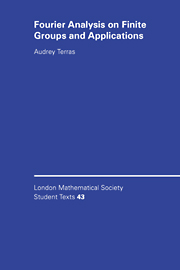Book contents
- Frontmatter
- Contents
- Preface
- Part I Finite Abelian Groups
- 1 Congruences and the Quotient Ring of the Integers mod n
- 2 The Discrete Fourier Transform on the Finite Circle ℤ/nℤ
- 3 Graphs of ℤ/nℤ, Adjacency Operators, Eigenvalues
- 4 Four Questions about Cayley Graphs
- 5 Finite Euclidean Graphs and Three Questions about Their Spectra
- 6 Random Walks on Cayley Graphs
- 7 Applications in Geometry and Analysis. Connections between Continuous and Finite Problems. Dido's Problem for Polygons
- 8 The Quadratic Reciprocity Law
- 9 The Fast Fourier Transform or FFT
- 10 The DFT on Finite Abelian Groups – Finite Tori
- 11 Error-Correcting Codes
- 12 The Poisson Sum Formula on a Finite Abelian Group
- 13 Some Applications in Chemistry and Physics
- 14 The Uncertainty Principle
- Part II Finite Nonabelian Groups
- References
- Index
14 - The Uncertainty Principle
from Part I - Finite Abelian Groups
Published online by Cambridge University Press: 06 July 2010
- Frontmatter
- Contents
- Preface
- Part I Finite Abelian Groups
- 1 Congruences and the Quotient Ring of the Integers mod n
- 2 The Discrete Fourier Transform on the Finite Circle ℤ/nℤ
- 3 Graphs of ℤ/nℤ, Adjacency Operators, Eigenvalues
- 4 Four Questions about Cayley Graphs
- 5 Finite Euclidean Graphs and Three Questions about Their Spectra
- 6 Random Walks on Cayley Graphs
- 7 Applications in Geometry and Analysis. Connections between Continuous and Finite Problems. Dido's Problem for Polygons
- 8 The Quadratic Reciprocity Law
- 9 The Fast Fourier Transform or FFT
- 10 The DFT on Finite Abelian Groups – Finite Tori
- 11 Error-Correcting Codes
- 12 The Poisson Sum Formula on a Finite Abelian Group
- 13 Some Applications in Chemistry and Physics
- 14 The Uncertainty Principle
- Part II Finite Nonabelian Groups
- References
- Index
Summary
To get some feeling for the size of the limit given by Heisenberg's relation, suppose that the position of an electron is measured to the accuracy of one part in a nanometer (10−9 m); then the momentum would become so uncertain that one could not expect that, one second later, the electron would be closer than 100 kilometers away!
R. Penrose [1989, p. 248]The uncertainty principle is widely known for its “philosophical” applications: in quantum mechanics, of course, it shows that a particle's position and momentum cannot be determined simultaneously (Heisenberg [1930]); in signal processing it establishes limits on the extent to which the “instantaneous frequency” of a signal can be measured (Gabor [1946]). However, it also has technical applications, for example in the theory of partial differential equations (Fefferman [1983]).
D. Donoho and P. Stark [1989, p. 906]The classical uncertainty principle says that a function and its Fourier transform cannot both be highly localized or concentrated. In quantum mechanics, this becomes the statement that it is impossible to find a particle's position and momentum simultaneously, as Penrose makes quite explicit in the quote above. But, as Donoho and Stark remark, the uncertainty principle shows its (ugly/beautiful) face in many other areas such as signal processing and medical imaging. References for this chapter are Donoho and Stark [1989], Dym and McKean [1972], Grünbaum [1990], Smith [1990], Terras [1985, Vol. I], Elinor Velasquez [1998], and Wolf [1994].
Information
- Type
- Chapter
- Information
- Fourier Analysis on Finite Groups and Applications , pp. 223 - 236Publisher: Cambridge University PressPrint publication year: 1999
